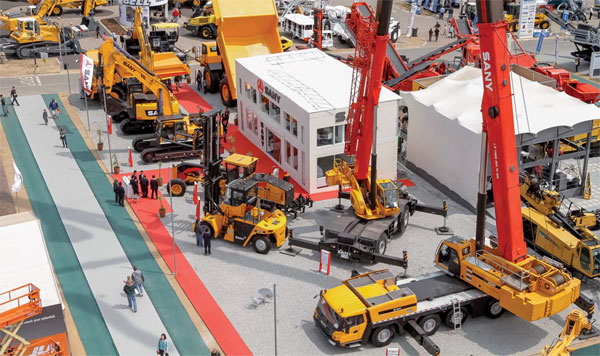Sany digs deep to lay its foundations
|
Sany's mining machines at the first Bauma Africa in 2013 in Johannesburg. Photo provided to China Daily |
Machinery maker advocates long-term view for Chinese firms entering Africa
Africa's industrialization and the multitude of infrastructure projects throughout the continent are giving Chinese heavy equipment maker Sany Group huge scope to reinforce its growth strategy outside China.
However, Xiao Jiang, general manager of Sany Central Southern Africa, says that while Africa has tantalizing potential as a market, any Chinese company contemplating taking advantage of it needs to take a long-term view.
Sany CSA is a subsidiary of Sany Group, and sells machinery used in building roads, mining, harbor drenching and lifting, among others. Last year the value of Sany CSA's sales was $250 million.
"If all you do is scramble for market share by offering the lowest price and don't care about related services, it's only a matter of time before your operations fold," Xiao says.
"Chinese companies in Africa need to remember that having a solid foundation and a long-term strategy is a must."
Penetrating a foreign market can be tough going, particularly in the early stages, Xiao says, and Sany is concentrating on setting up a regional platform to complete the chain locally, so that it has a long-term future in Africa.
"In our industry, selling machinery is a primary-stage activity in a long industry chain. You can't just sell new machinery. You need to offer other services as well, such as spare parts support, after-sales service, maintenance, training, financing, rental and other related services."
Sany Group's business is essentially divided into domestic and overseas markets, each being independent of the other. It has 10 offices outside China, and Sany CSA is the biggest one in Africa.
The company's activities take in 30 African countries, and it has five local companies in the continent, in Angola, Congo, Ghana, South Africa and Zambia, Xiao says.
Zeng Hongbo, marketing director for Sany South Africa, says the value of its annual sales is two and a half times of all its Chinese competitors in the country.
"Our sales totaled about $70 million last year, while the whole region's were more than $250 million, meaning we have maintained annual growth of more than 40 percent. In 2012 we had explosive growth thanks to mining in Ghana."
Sany entered Africa in 2002 when it started selling equipment either to Chinese companies or to other companies through local agents, and two years later decided to set up a physical presence in the continent.
"The number of staff stationed in Africa reached a peak of more than 400 in 2007, but we thought the way we were selling was inefficient and unsustainable, so in 2009 we overhauled the way we sell."
Since then Sany has set up 30 subsidiaries worldwide that offer ancillary services, and sales operations were overhauled, giving agents a key role. Representative offices in various countries were supplanted by bigger regional offices.
Of Sany's original decision to enter Africa, Zeng says: "At the time, all the leading heavy equipment companies felt that the only way to survive in the long run was to go international."
In South Africa, about 90 percent of Sany's customers are local, Xiao says.
"But in other main markets such as Angola, Cameroon, Ghana and Tanzania it's split between local companies and Chinese companies."
Sany's products have been proven in construction projects worldwide, he says, including the main stadium of the football World Cup in South Africa in 2010, a railway line linking Johannesburg and Pretoria, emergency work on the Fukushima nuclear power station in Japan and in a mining disaster in Chile.
Xiao says Sany's machinery enjoys a price advantage over that of its competitors in Europe and that its prices are close to those of its Japanese competitors.
"But among Chinese and South Korean heavy machinery makers there is no doubt our products are more expensive. That's because of our outstanding competitive advantages."
In China Sany has a research and development team of more than 6,000 engineers.
"We also have the largest manufacturing base and best machinery in China," Xiao says.
Opening a manufacturing plant in Africa is unrealistic right now, but an assembly plant is in the planning stages, he says.
"We have bought a piece of land in Johannesburg and plan to build a semi-knocked down assembly plant to save on transport costs."
A logistics and maintenance center will be built in the same place, he says.
Local assembly will add a sharp competitive edge to Sany, and it expects to assemble its first excavator in South Africa this year, followed by cranes, road construction machinery and harbor dredging equipment.
"When the maintenance center and assembly plant are completed, we will create more jobs for local workers and transfer skills to them," Xiao says.
"We are negotiating with local authorities, wanting to work with them to run certificate programs for local workers. We're not just selling machinery in Africa. We're also helping improve industrial skills."
Flip Hennop is the agent for Sany's cranes in South Africa, and was its first customer in the country. Two Sany cranes he sold in 2008 helped win him over, and he became the company's agent for them in 2010.
"They helped us establish the sales network, service team, as well as the maintenance and spare parts center."
Sany's cranes had the biggest market share for cranes last year, he says, and that share continues to grow.
Serge Levy, a new Sany agent, says the company's agent model works well.
"We can talk with them about nearly everything in the market to ensure the channels are smooth and that products satisfy local needs."
The quality of the system guarantees that his company makes money, he says.
Shouldering social responsibility is another significant aspect of Sany's long-term strategy in Africa. The company has partnered with the Children's Center of Johannesburg and several local orphanages in charity work.
lilianxing@chinadaily.com.cn



















